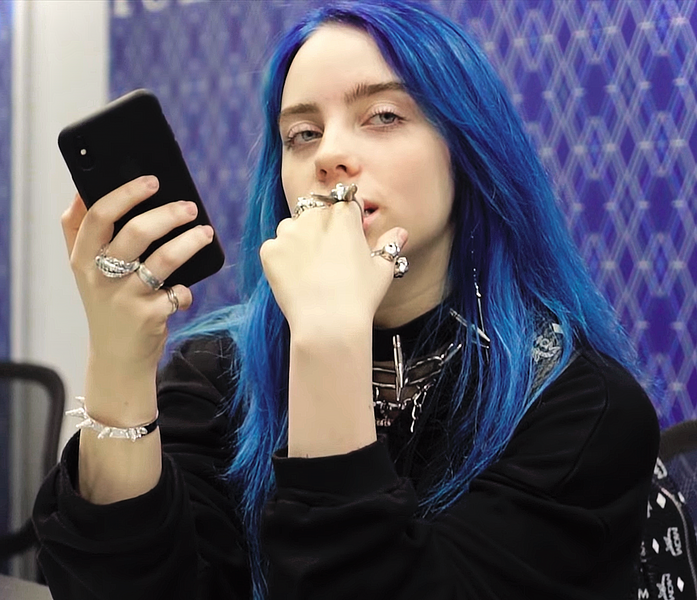in 10 months Billie Eilish has developed a mid-30’s wine mom body. pic.twitter.com/pMRFdZZ7mE
— GamesNosh (@GamesNosh) October 13, 2020
I grew up as a teenager in the 90s at the height of the waif era, when supermodels were so thin that they practically disappeared when they turned sideways.
They had no hips, butts, or curves, and Kate Moss was the gold standard of beauty at the time.
Everywhere I turned, I was bombarded with the same message—that thin was in. On my favourite TV shows and in movies, the lead girl was always exceptionally skinny, and she always got the guy. In magazines and on billboards, there were images of super skinny women subtly (or not so subtly) telling you that thin was what you had to achieve to be happy and successful.
As a young girl, I would watch my mom fastidiously counting her calories and foregoing dessert. She was slim, but I was always a slightly chubby kid, prone to gaining weight easily. My best friend who lived across the road could eat an entire box of cookies and stay skinny, but I did not have this luxury—as adults were always reminding me. Older family members and neighbours would pinch my arms and tell me they were “meaty,” or poke my protruding belly.
I was about 10 years old when I started to watch my weight because I thought that was just what you had to do.
In high school, a lot of girls had eating disorders because, for most women, skinny does not come naturally. We caved to the pressure to be thin because it was virtually impossible to avoid. One day, I grew tired of the comments and decided to lose weight, no matter how. I restricted my food as much as possible without my mother noticing and sometimes threw out my dinner surreptitiously. Looking back at old photos of myself, I was skinny. But the f*cked up thing is, I thought I was fat.
Now that we’re living in the age of social media, I can’t even imagine the pressure that young girls are feeling. Posting selfies and leaving themselves vulnerable to the comments, analyzing the total number of likes, and comparing themselves to others. It’s frankly terrifying to think about the effect of this on the psyche of a developing preteen, at one of her most sensitive and vulnerable times in life. Suicide rates are climbing among girls in this age group, and it is disturbing.

Three years ago, on a last-minute vacation to Curaçao with my friend’s family, I bonded with her nine-year-old niece. She was smart and advanced for her age, and she already had an Instagram account.
One day, we were taking a photo together on the beach in our bathing suits and she wrapped her arms around my waist and hugged me. I said without thinking, “Oh good, you’re hiding my belly,” and she looked up at me in sheer bewilderment asking, “Why?”
I didn’t know how to respond, and then it hit me—I was projecting three decades of internalized body hatred onto an innocent young girl.
In the darkest year of my life, I was probably at my thinnest. I was wracked with anxiety, suffered almost daily panic attacks, and could barely eat. Looking on with envy at couples and groups out in a restaurant enjoying a relaxed meal, I was always on high alert for the next panic attack.
In that year, I lost about 20 pounds and had to buy new clothes because my pants were falling off my shrinking body. And people at the gym, and at work, and neighbours were constantly complimenting me on the weight loss. They obviously didn’t know what I was going through, but it was f*cked up. It felt like my soul was dying inside, but on the outside, I had finally achieved greatness.
Although we have come a long way in North American society by introducing a wider range of body types in the media, there is still a lot of pressure on women to be thin and fit.
According to The Beauty Myth, by Naomi Wolf, it’s a way of keeping women down—if we focus too much on our bodies and our looks, we won’t have as much time left to advance in our careers.
My mom left a copy of this book on my bed as a teenager with relevant pages highlighted, and it pulled me back from the brink of developing a full-blown eating disorder. She had given up trying to talk to me about it, but something in this book spoke to me, and I realized what a waste of time it was to be so hyper-focused on losing weight.
It is heartening to see that body-shaming is now a part of our vernacular because it wasn’t when I was growing up, but there is still work to be done. We have to be clear in our body-positive messaging to girls—thin doesn’t necessarily equal health and happiness. Thin is most definitely not in.
I don’t have kids, but if I had a daughter, I would teach her that your intelligence, kindness, and compassion are a thousand times more important than what you look like on the outside. What you can do in sports, in math, how many books you can read—those are the real goals to aspire to. And ultimately, your beautiful soul is the only thing that matters.








Read 11 comments and reply